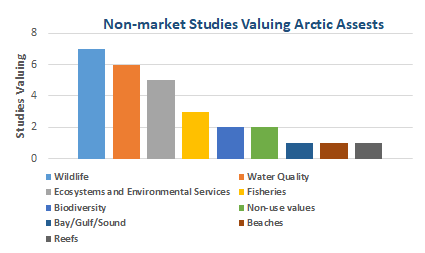
The Arctic ocean and coastal areas provide much more economic value than
the commercial products and services that are estimated on our website.
Natural resources that are not traded in the market place also carry values
that are often overlooked when development decisions are made. Some of
these values are environmental assets and services which might protect
communities; others contribute to spawning grounds for fisheries or
habitats for marine mammals that ultimately find their way into the
marketplace. Others reflect poor human use and practices and reflect
costly losses such as current impacts of climate changes in the arctic
which are eroding coastlines and forcing indigenous peoples to uproot
centuries of cultural traditions and migrate to less vulnerable areas to
begin again. Overfishing, polluted waters and the melting of the tundra
on land are a few of the non-market costs that are too often overlooked
and not incorporated into economic considerations.

Assets Values Studies
This Non-market site of the NOEP provides reliable studies carried out
by experts that offer estimates for these important values. Without
considering these values, important natural resources and recreational
assets and services could be lost forever. In this unique and fragile
part of our planet, these values are even more important than other places
and need attention. This collection is specific to the Arctic, but has
also been incorporated into the broader NOEP bibliographic non-market
site as well. A notable feature is the relatively few studies that have
been done in a place with such a rich natural resource base. We shall
continue to update this site as more studies become available. Please
note you can search by asset, geography, author, date of study, etc.
And in most cases, you can access the study directly or through a link
or an abstract we provide.
For further explanation of non-market valuation studies and how to
interpret their methodologies, please go to this place on our website
where the larger collection sits.
"What You Should Know (FAQs)"



